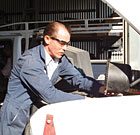
Ron Pouncey, the equipment services manager at Metro Mechanical, checks a truck’s engine to make sure it’s running properly. He will also adjust the tire pressure and replace the air filter, all of which can result in significant fuel savings.
The New Year is typically a time when people celebrate fresh starts and new beginnings. Unfortunately, the price of oil caused a rude awakening for many, as the first week of January saw the cost of crude jump to over $100 per barrel. According to AAA, the New Year is usually a time of lower oil and gasoline pricing, but inventory concerns and geopolitical conflict are playing substantial roles in influencing the market so far this year.
Demand for oil is expected to increase 2.5 percent in 2008, stated the International Energy Agency, with world consumption rising to 87.8 million barrels a day, which is 2.1 million more barrels than in 2007. This increased demand, along with slowing supply, is causing some to speculate that the price of crude will double to $200 a barrel by the end of the year.
Other analysts say the slowing U.S. economy will cause prices to settle around $74 to $78 per barrel by the fourth quarter. Of course, no one knows where oil prices will go in 2008, butBloomberg Newsrecently noted that most strategists didn’t foresee last year’s 57 percent gain in oil prices.
Based on the ongoing volatility in the oil market, it is probably safe to predict that gas prices will remain high for the near future, which isn’t good news to contractors. Higher gas prices mean lower profit margins, and many dealers are looking for ways to reduce their fuel consumption in order to remain competitive.
HYBRIDS AND TUNE-UPS
Rising fuel costs are a major issue at Metro Mechanical Inc., Phoenix, which specializes in commercial and industrial HVAC, plumbing, sheet metal, fire protection, and emergency service in all disciplines. The company’s 115 trucks fan out across the state of Arizona every day, servicing accounts in the metropolitan Phoenix area, as well as in far-flung cities such as Globe and Casa Grande.“The increased cost of fuel obviously affects our company as well as our customers,” said Lou Jennings, executive vice president, Metro Mechanical Inc. “We’re not limiting our service area, and we’re not raising prices for outlying areas, but of course, we’re trying to manage fuel in the most responsible, common-sense way, and at some point, that will be reflected through our hourly rates.”
Regularly scheduled tune-ups help ensure that Metro Mechanical’s large fleet of one- to 12-year-old trucks operates safely and at peak performance. The company has its own Equipment Services Division, which consists of a well-stocked, three-bay shop where dedicated auto mechanics check out the trucks at 3,000-mile intervals.
This may seem like common-sense advice, but checking the engine, adjusting tire pressure, and replacing air filters on a regular basis can result in significant fuel savings. In fact, the U.S. Department of Energy estimates that replacing a clogged air filter can improve a car’s gas mileage by as much as 10 percent, while properly inflated tires can improve gas mileage by 3.3 percent. Conversely, underinflated tires can lower gas mileage by 0.4 percent for every 1 psi drop in pressure of all four tires.
Metro Mechanical is also making the move to hybrid cars for its employees who do not have to carry tools or a ladder. “The goal is to implement that form of technology to save fuel and to intentionally demonstrate to the community and our clients that conservation is a good thing. It’s the real thing. It’s trying to be responsible,” said Jennings.
And driving a hybrid vehicle just “makes you feel good,” added Jennings. He drives an all-wheel drive Ford Escape hybrid that gets about 37 mpg in the summer and up to 42 mpg in the winter. The car cost approximately 5 percent more than a nonhybrid vehicle, but the fuel savings and the positive client feedback more than make up for the initial expenditure.
“I think with all the ground we need to cover in order to provide excellent customer service, these hybrids offer a tremendous opportunity going forward,” said Jennings.

Tom Warner, president, Utility Service Express, LLC, is saving money by making fewer sales calls; instead, he’s using an online quoting system at the company’s Website.
QUOTES GO ONLINE
What would you say if someone told you it was possible to boost the bottom line and reduce fuel costs by cutting back on in-person sales calls? Might seem like crazy talk, given that once a dealer is invited into a home or business to give a sales pitch, the more likely a sale will ensue. That’s just not true, said Tom Warner, president, Utility Service Express, LLC, Reston, Va., who uses an online quoting system, which has increased his sales and reduced the amount of time he spends driving from one sales call to another.“Our prices for installed HVAC systems are available online for the empowered customers who are shopping on the Internet,” said Warner. “At their convenience, customers now shop and compare brands online, and we enable them to receive a quote online for the total job. When a customer receives an online quote, we close 66 percent of those jobs, once we go to the job site for a 15-minute visit to verify the customer’s data input.”
This online system has been available since May 2005, when Warner realized there was simply no way to keep up with the number of people asking for quotes. As a Trane Comfort Specialist™ seeking customer leads from a sales kiosk inside a large retailer, Warner received thousands of requests for verbal quotes. He found that customers were always stressed for time, but many knew of a neighbor whose unit had recently failed, so they wanted quotes in order to consider a replacement.
“Many times people were just looking for a second quote, because someone else had already quoted a system and the BBB and other consumer advocates recommend obtaining at least two other quotes,” said Warner.

Butch Welsch, president/owner, Welsch Heating and Cooling, installed GPS on his service trucks, which has significantly reduced the amount of gas that is being used.
The questions on Warner’s Website ask all about lifestyle issues, indoor air quality concerns, access to equipment, and home size, as well as the grade of equipment quality that is desired (e.g., absolute best quality, premium quality, standard system, low budget). The extensive list of questions results in quotes that are accurate 95 percent of the time. Occasionally there are duct problems or code issues that require additional work, but otherwise, the quotes are almost always right on target.
Customers love getting their quotes online, and so does Warner, especially because the system generated an extra $511,000 in revenue last year. In addition, he doesn’t have to spend hours at customers’ homes presenting all the different equipment options, because homeowners who obtain a quote online already know what they want. Warner truly believes in no-pressure selling, so while he may occasionally suggest a better alternative, he does not routinely upsell homeowners once he arrives to verify a customer’s system and sign a contract.
“As a contractor, you’re raised to not give prices over the phone,” said Warner. “But with gas prices the way they are and the terrible traffic around the Washington, D.C. area, the online quoting system is the neatest thing going on.”

Metro Mechanical is purchasing hybrid vehicles for employees who do not have to carry tools or a ladder. Lou Jennings, executive vice president, is shown here with his new company car.
GPS SAVES FUEL
Starting Jan. 1, high gas prices and major traffic congestion became even more of a problem for Butch Welsch, president/owner, Welsch Heating and Cooling, St. Louis. In the space of two weeks, he saw gas prices rise $0.40/gallon, and several sections of I-40 - the major highway running through St. Louis - close for the next year.“Right now gas is $3/gallon, and the highway closures are an enormous issue. In addition to the seven-mile stretches that are closed for the next year, they’re also tearing down and rebuilding about 15 bridges that cross Highway 40. That knocks out the north-south methods of going back and forth, and limits east-west traffic,” said Welsch.
That adds up to a major headache, given that Welsch has 54 trucks on the road every day, servicing homes and businesses in the greater St. Louis area. Fortunately, the highway closures have been well publicized for the last few months, allowing Welsch to come up with a plan to route his technicians in the most efficient way possible.
“We basically segmented the area, so there are guys who stay north of Highway 40 and guys who stay south of it,” said Welsch. “We’re fortunate to have 20 service technicians right now, which allows us some pretty good flexibility in keeping guys in a particular area. The difficulty is that a lot of our technicians have loyal customers, and the customer doesn’t care about the geographic problems. Even working around those issues, we’re averaging about 20 percent drive time, or 12 minutes of drive time per hour.”

Welsch Heating and Cooling sends out 54 trucks each day in order to serve homes and businesses in the greater St. Louis area. High gas prices and local freeway closures are making it difficult to save fuel.
“It amazes me how much we’ve saved. And it’s scary to think about how much we must’ve been losing all these years,” said Welsch. “The system tells us where the trucks are over the weekend (they’re supposed to be sitting at home), how long a truck is idling, and whether the driver is speeding. It also helps our dispatcher route the trucks much more efficiently.”
Segmenting his service area and installing GPS have helped save costs in the short term, but there’s no doubt that the increasing price of fuel will eventually cause other changes at Welsch Heating and Cooling.
“We have already seen a difference in our profit. Our budget for fuel in 2007 was off by something like $0.50/gallon, and that shows up directly in the bottom line. We honestly didn’t anticipate how high gas would go. Right now we’re doing everything we can to solve the problem without raising prices, but the fact of the matter is, these are real costs that are not going to go down, so prices will have to be raised to reflect the increase.”
Publication date:02/04/2008






